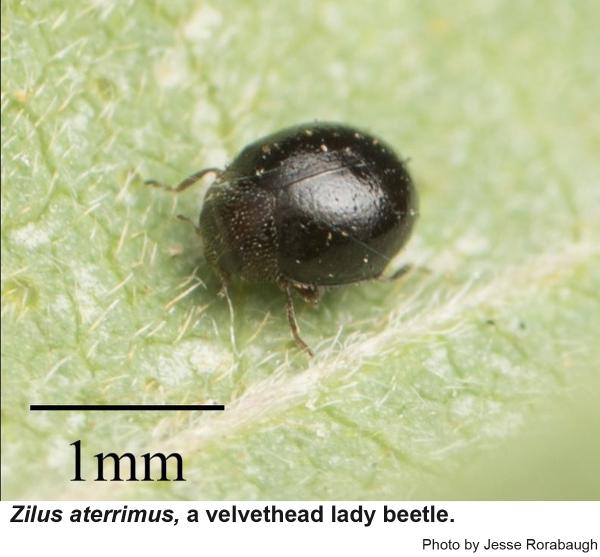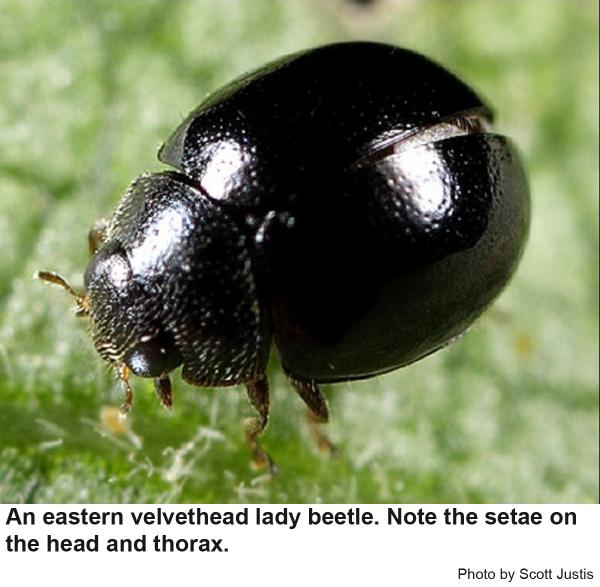Description and Biology
The eastern velvethead lady beetle, Zilus horni, is a very small (1/16 inch), black, shiny, oval insect that has noticable setae on the thorax and face, hence the name "velvethead." Its feet are brownish. Females lay tiny, oval eggs usually in small groups and usually near prey. From eggs hatch tiny, elongate larvae some species of which secrete a fluffy covering that resembles a mealybug. The larvae eventually pupate usually by fastening to the leaf by the rear end. Some time later a new generation of adults emerges. It is likely that the eastern velvethead lady beetle overwinters as adult beetles in some sheltered place. Little has been published on the biology of velvethead lady beetles.
Prey
Lady beetles in the genus Zilus are predators of armored scale insects (although I have collected a Zilus lady beetle associated with the crapemyrtle aphid). One species of Zilus has been found to feed on whitefly nymphs although they seem to feed largely or entirely on armored scale insects. In general, lady beetle larvae and adults may supplement their diet with flower nectar and honeydew when prey is scarce.
Residential Recommendations
When treating for armored scale insects, consider using a horticultural oil. These oils are relatively safe for humans, pets, and lady beetles. On the other hand, oils are effective for supressing armored scales, spider mites, aphids, and various other plant pests.
Other Resources
- Armored Scale Identification and Management on Ornamental Plants. Frank, S. 2019 (revised). Entomology Insect Notes, NC State Extension Publications.
- Horticultural Oils for Ornamental Plants. Frank, S. et al. 2018. Entomology Insect Notes, NC State Extension Publications.
- Lady Beetles in the Landscape. Frank, S. and J. R. Baker. 2019 (revised). Entomology Insect Notes, NC State Extension Publications.
- Ladybirds, Ladybird beetles, Lady Beetles, Ladybugs of Florida, Coleoptera: Coccinellidae. Frank, J. H. and R. F. Mizell, III. 2018. University of Florida IFAS Extension.
- Extension Plant Pathology Publications and Factsheets
- Horticultural Science Publications
- North Carolina Agricultural Chemicals Manual
For assistance with a specific problem, contact your local Cooperative Extension Center.
This Factsheet has not been peer reviewed.
Publication date: Jan. 11, 2020
Revised: Jan. 30, 2020
Recommendations for the use of agricultural chemicals are included in this publication as a convenience to the reader. The use of brand names and any mention or listing of commercial products or services in this publication does not imply endorsement by NC State University or N.C. A&T State University nor discrimination against similar products or services not mentioned. Individuals who use agricultural chemicals are responsible for ensuring that the intended use complies with current regulations and conforms to the product label. Be sure to obtain current information about usage regulations and examine a current product label before applying any chemical. For assistance, contact your local N.C. Cooperative Extension county center.
N.C. Cooperative Extension prohibits discrimination and harassment regardless of age, color, disability, family and marital status, gender identity, national origin, political beliefs, race, religion, sex (including pregnancy), sexual orientation and veteran status.


